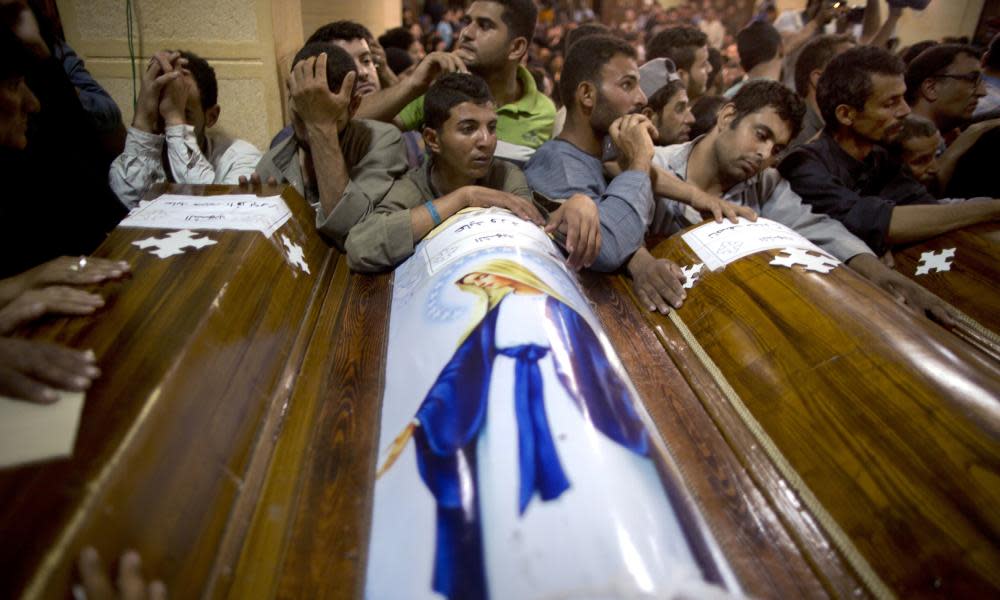Egypt hits Libyan terror camps again after attack kills 29 Copts

Egypt launched a fresh wave of air strikes against Libyan terrorist bases on Saturday in response to the killing of 29 Coptic Christians south of Cairo, with a warning of further retaliation possible.
The airstrikes follow six bombing raids in Libya that hit the north-eastern coastal town of Derna on Friday, with Cairo officials saying bombs struck terrorist training camps of the Shura Council, aligned with al-Qaida.
Pictures from Derna on social media showed devastated buildings but there were no reliable casualty numbers.
The savagery of the attack on the Copts, with at least two children, aged two and four, among the dead, has shocked Egypt. The Copts had been travelling to the monastery of St Samuel the Confessor, 85 miles south of Cairo, when their small convoy was halted on a desert road by up to 10 gunmen dressed as soldiers, who then opened fire.
Although Egyptian forces targeted an al-Qaida affiliated group, the responsibility for the attack was claimed by Islamic State, which has carried out previous atrocities against Egypt’s Copts. Libyan sources say Egypt has indicated more attacks, possibly including groundstrikes, are being considered by Cairo.
Within hours of Friday’s killings, the president of Egypt, Abdel Fatah al-Sisi, declared: “Egypt will not hesitate to strike terrorist camps anywhere.” The president told Pope Towadros II, leader of the Coptic church in Egypt, that the state would not rest easy until the perpetrators of the attack were punished.
In Genoa, Pope Francis prayed for the Copts, saying that today there were more Christian martyrs for the faith than in ancient times. He prayed “for our brothers, Egyptian Christian Copts who were killed because they did not want to renounce their faith”.
Egypt has been in a state of emergency since two suicide bombings killed 45 people at Coptic churches last month, following December’s slaughter of 29 Copts in a Cairo cathedral.
The bombing highlights Libya’s position as a haven for jihadist groups, with the civil war leaving much of the country in chaos and jihadi groups proliferating.
Neighbouring countries are also coming under attack from Libya-based jihadists. Tunisia is fighting a cat-and-mouse battle with Isis terrorists crossing back and forth from Libya. Seifeddine Rezgui, who killed 38 tourists, 30 of them British, on a beach in Sousse two years ago, was trained by Isis in the western Libyan town of Sabratha.
Isis itself is on the back foot in Libya, its main base at Sirte having been overrun in December after a bloody six-month campaign by Misrata militias backed by US airstrikes. But its response has been to withdraw further into Libya’s vast Sahara. On Friday, four Libyan soldiers were killed battling Isis near the desert town of Bani Walid.
Diplomats say airstrikes alone will not purge Libya of terrorists, and are pinning their hopes on the end of a civil war between Libya’s two rival governments to bring peace and allow terror groups to be cleaned out. That is a distant prospect, with Tripoli’s all-powerful militias fighting one of their periodic turf wars this weekend. The battle was witnessed on Friday by British ambassador Peter Millett who tweeted: “Can hear explosions & artillery fire in south Tripoli.”
The Foreign Office will not be offering consular visits to Manchester bomber Salman Abedi’s father, Ramadan, and younger brother, Hashim, who were arrested by a pro-government militia last week. Salman Abedi is believed to have spent three weeks in Libya shortly before the attack.

 Yahoo News
Yahoo News 
